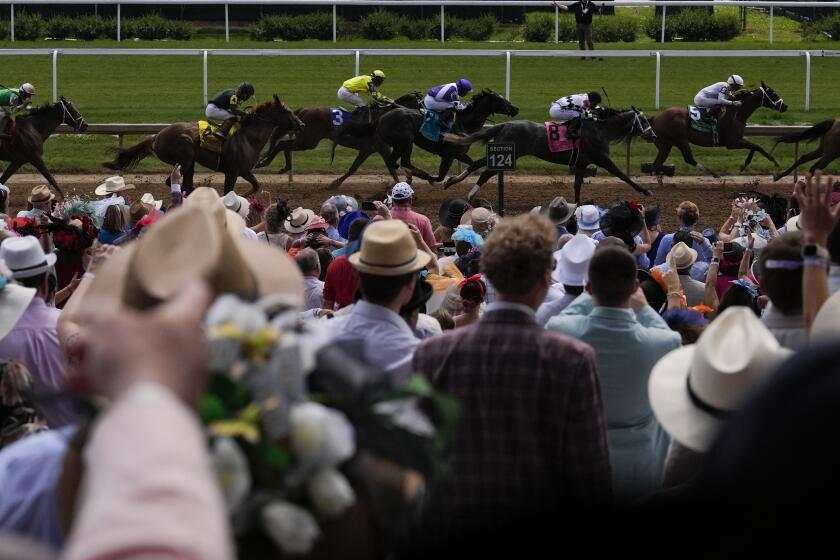Legislation Targets Steroid Use
- Share via
SACRAMENTO — Dismayed by new disclosures of the use of steroids in Major League Baseball, a state senator wants to force most professional sports teams to test athletes for performance enhancing drugs if they play games in California.
State Sen. Don Perata (D-Alameda) said the Legislature must do what baseball and the National Hockey League have not: Mandate random drug testing to ensure players do not compete while juiced.
Unveiling his legislation Thursday, Perata called steroid use “out of control” and said it is “not only unfair in terms of competition on the field, but also sends a terrible message to our kids.”
“I’m very serious about this bill,” said Perata, a sports fan who listens to baseball games on the radio while gardening. “We test [race]
horses, for crying out loud. Why aren’t we testing these players?”
Debate over the use of steroids in athletics flared anew recently when retired baseball slugger Jose Canseco estimated that 85% of major-league players use the muscle-building drugs. Soon after, Ken Caminiti, a former National League MVP who is also retired, told Sports Illustrated that he was injecting steroids at the peak of his career.
Although the National Football League and National Basketball Assn. prohibit steroids and test for them, neither baseball nor the NHL has a screening policy.
A spokesman for Major League Baseball said the league is “very concerned” about steroid use and has presented a drug-testing proposal to the players union as part of ongoing collective bargaining negotiations.
Spokesman Richard Levin said the league believes steroid use not only threatens the health of players but also creates problems in terms of the purity of competition on the field.
“We want our fans to be sure we run a game that has integrity,” Levin said.
The Major League Baseball Players Assn., the most powerful union in professional sports, has historically opposed random testing, mostly on privacy grounds. Greg Bouris, a union spokesman in New York, declined to comment on the proposed legislation Thursday, saying only that the players see steroid testing as “a very serious and complicated issue.”
Frank Brown, a spokesman for the National Hockey League, said, “We don’t see steroids as an issue” and declined to comment further.
Anabolic steroids elevate the body’s testosterone level, increasing muscle mass. They are illegal in the United States unless prescribed by a physician for medical reasons, but readily available over the counter in many parts of Latin America.
Studies have linked steroids to heart, kidney and liver damage, stroke, aggressive behavior, sterility and genital dysfunction.
A decade ago, their use in baseball was considered the realm of only a smattering of sluggers. They were a more common worry in the NFL, especially after the death of Lyle Alzado from brain cancer he blamed on the drugs.
Perata’s bill would require any professional athletic association with revenue exceeding $1 billion annually to establish a random drug testing program that screens each athlete at least once a year. The programs--testing for steroids, human or animal growth hormones and similar substances that boost performance--would be reviewed by the California Athletic Commission.
Players who flunk would be subject to suspension, and leagues that refuse to adopt a testing program would be banned from holding events in California.
Perata said it is the Legislature’s duty to attack the steroid problem, especially given studies by the National Institute on Drug Abuse that show a huge jump in use of the drugs by teenage athletes.
Maurice Williams, a 16-year-old football player at Oakland High School, appeared with Perata and said pressure on young athletes to “have that extra edge” and stand out is intense.
“Some people will do whatever it takes to get to the next level,” said Williams, who dreams of playing pro football but won’t use steroids to get there. “They figure it’s a lot easier to pop a pill in your mouth than to spend a lifetime lifting weights.”
Perata already has the support of several powerful lawmakers, including Sen. Sheila Kuehl (D-Santa Monica). Kuehl said the health risks of steroids concern her, and added: “It seems to me that the faith of the common sports fan is undermined when their athletes are using substances that allow them to cheat, in a way.”
But Republican Sen. Ray Haynes of Riverside said the Legislature has other priorities and should leave the problem to the leagues.
“I don’t like drugs in sports, but if people think baseball isn’t committed to solving this problem, then they’ll stop going to games,” Haynes said.
“This is crazy. We don’t need a law on this.”
Despite such sentiments, Los Angeles Dodgers Vice President Derrick Hall said the ballclub would probably support the Perata bill, though he predicted the problem would more likely be resolved through collective bargaining.
“I think this bill just echoes the concerns that we as an industry have about steroids,” Hall said. “The sooner we have an agreement on ways to prevent use of the drugs, the better.”
The legislative interest in Sacramento comes a day after U.S. Sen. Byron Dorgan (D-North Dakota) announced plans to hold investigative hearings on the use of the drug in professional sports, the Olympics and among college athletes.
More to Read
Go beyond the scoreboard
Get the latest on L.A.'s teams in the daily Sports Report newsletter.
You may occasionally receive promotional content from the Los Angeles Times.










